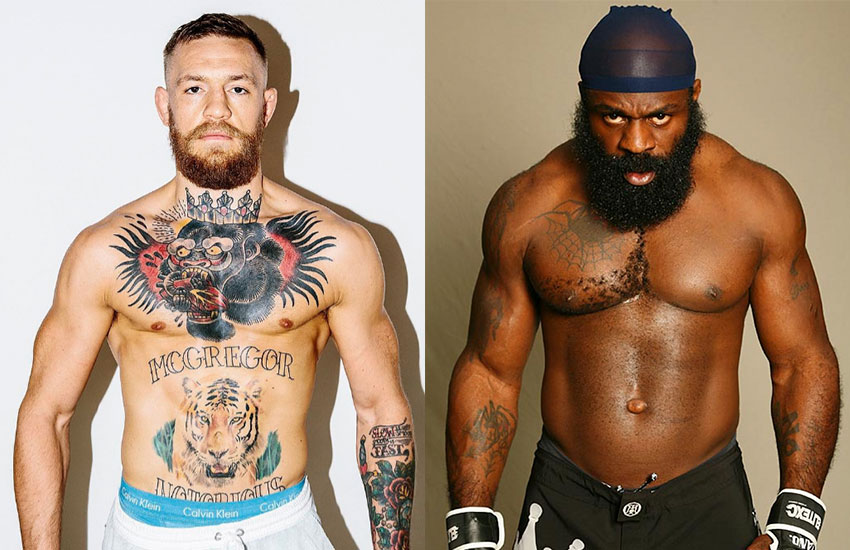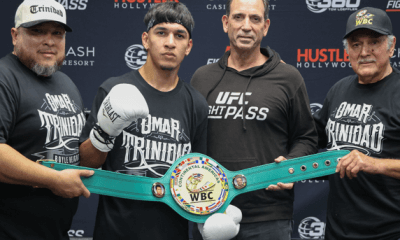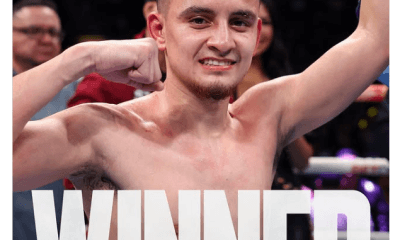Featured Articles
Gary Shaw’s Version of Conor McGregor Was Kimbo Slice

It has been suggested that, at this 21st century stage of human development, there is no such thing as a truly original idea, only gussied-up versions of previous attempts at creating something unique. Perhaps more so than anyone else, Gary Shaw understands the rationale for pairing boxing great Floyd Mayweather Jr. and mixed martial arts sensation Conor McGregor. It’s basically the same notion that Roman emperors and their minions had when they would pit captured beasts from faraway lands, say a lion and a tiger, in the Colosseum. The Roman satirical poet Juvenal (circa 100 A.D.) coined the phrase “bread and circuses” to describe the practice of staging elaborate and costly games – chariot races, anyone? — in order for those in power to maintain control by periodically distracting their increasingly bored and restless subjects.
Boxing has not been around forever, although it sometimes seems like it, so Mayweather vs. McGregor, to be contested under boxing rules, has been relentlessly hyped as a fresh twist on a familiar format. Can the preening Mayweather, staunch upholder of his sport’s status quo, preserve order by putting away McGregor, a crass party-crasher from another combat-sport discipline? The lion again is doing battle with the tiger for entertainment purposes, and all indications are that pay-per-view and gross-revenue records will fall like tall wheat before the scythe.
But there is nothing really new or innovative about Mayweather vs. McGregor, except for the fact that each man’s reputation in his own realm is such that they come into Saturday night’s megafight at Las Vegas’ T-Mobile Arena (to be televised via Showtime Pay Per View) with large, established fan bases that will be augmented by untold millions of the curious lured by what they’ve been promised is an event unlike anything they’ve ever witnessed. And maybe what will be delivered will prove at least somewhat worthy of the stiff tariff ponied up by on-site attendees and PPV subscribers, although Shaw has grave reservations.
“I don’t see any MMA fighter beating a boxer under boxing rules, especially one of Floyd’s class,” said Shaw, who has been on both sides of the philosophical chasm as president of his own boxing promotional company, Gary Shaw Productions and president of now-defunct EliteXC Live Events, a failed MMA challenger to the supremacy of UFC. “The footwork is different. Going from four-ounce gloves to eight-ounce gloves is an immense difference. Plus, a boxer is used to seeing where his opponent is, in terms of technique and distance. It’s not the same in MMA, where there’s standup but also kicking and ground-and-pound.
“Unless I’m very wrong, this is a fight that isn’t a real fight at all. I can’t imagine there’s any way that Mayweather can possibly lose. Now, if the fight was under MMA rules, McGregor would be just as much of a sure thing. He’d take Mayweather down quickly because Floyd doesn’t have those skills, and you can’t pick them up in an eight-week training camp. You just can’t.”
Now that he’s sold his boxing promotional company to Roc Nation Sports, with which he briefly was affiliated (“I lasted there about three weeks,” he said of an operation that appears to still be seeking its footing) and EliteXC has long since gone belly-up, Shaw, now 72, doesn’t have a reason to root for either of the expletive-spewing principals or their sport of origin. But that doesn’t mean he doesn’t have an interest as to what happens as, a decade or so ago, he had his own dream of creating a crossover superstar who could straddle the worlds of boxing and MMA like the Colossus of Rhodes. The vehicle through which Shaw would achieve such sweeping success was, much like McGregor, bearded, lefthanded, possessed of crushing punching power and a menacing scowl that could melt lead.
Shaw’s candidate for the kind of superstardom that many seek but few attain came into this world on Feb. 8, 1974, in Nassau, the Bahamas, as Kevin Ferguson. Most came to know him by his nom de guerre, Kimbo Slice. His legend withered before it had much chance to take root, but there can be no denying that Kimbo, who was just 42 when he died on June 6, 2016, was for a time considered to be larger than life, a comet streaking across the sky. Just as McGregor arrives at this juncture with liberal splashes of charisma and a compelling back story (see Wright Thompson’s enthralling profile in the Aug. 21 issue of ESPN the Magazine), Kimbo had an undefinable something that drew people to him like moths to an open flame. Shaw’s ambitious plan was to take Kimbo, who came to widespread attention through YouTube videos of unsanctioned, bare-knuckle brawls that saw him destroy opponents with Tysonesque brutality, and make him into the heavyweight champion of the world.
“Kimbo is one of those people that comes along every once in ages who has what I call the it factor,” Shaw said in the late spring of 2009. “I have a lot of fighters who come to me and are great talents but don’t have the it factor. Manny Pacquiao has the it factor. He’s a star. He reeks of stardom. People gravitate toward him.
“Kimbo is that way. When he walks into a room, he lights up that room. People yell `Kimbo! Kimbo!’ It doesn’t have anything to do with how he did in his last fight. It has to do with the it factor. When Tyson walks into an arena, everyone stands up. He’s Mike Tyson, of course, but he’s got that it factor.”
The phenom known as Kimbo Slice was first brought to my attention by my son Randy, who asked me to check out a YouTube video of the thickly muscled former linebacker’s backyard demolition of some large, hairy guy whose name now escapes me. It was a cruder, more violent and much-abbreviated version of Sonny Liston disassembling Floyd Patterson. But being unofficial ruler of Miami’s street-fighting scene to king of the ring is a quantum leap, so I paid no heed to rumors that already were circulating that this baddest of badass dudes might soon be trying his hand at, you know, actual boxing.
Depending upon which version of the story one chooses to believe, the 6-foot-1, 240-pound Kimbo Slice was either 0-0 in sanctioned boxing matches (according to BoxRec.com) or 7-0, with six knockouts (Wikipedia). Shaw said those seven bouts were indeed legit, and who cares if the list of Kimbo’s victims – James Wade, Tay Bledsoe, Charles Hackmann, Brian Green, Jesse Porter, Howard Jones and Shane Tilyard – is hardly a who’s who of professional pugilism. Pulverizing power might be the rawest and most primal of a fighter’s resources, but it can camouflage a lot of technical shortcomings. But before he could put himself into a position (if ever that was a possibility) to challenge either or both of the Klitschko brothers, Kimbo gave up his boxing dream to sign with UFC, whose president, Dana White, no doubt had taken note of the high ratings Kimbo’s MMA appearances on CBS had garnered for EliteXC.
Could Kimbo ever have approached anything even remotely close to the boxing potential as envisioned for him by Shaw?
“He wasn’t really young enough (37 when he ostensibly made his pro debut with first-round, 17-second knockout of Wade on Aug. 13, 2011) to be trying to make the transition, but he might have done well had he stuck with it,” Shaw said. “He was just so immensely strong that if he caught anybody on the chin, the fight was over. But he didn’t really train to put it all together in the boxing ring.”
Nor did Kimbo justify his initial burst of popularity in MMA (a 5-2 record with three knockouts in sanctioned matches, 1-1 in exhibitions). It factor or not, the onetime University of Miami football player and father of six with the made-for-Hollywood past (he had worked as a bouncer in a Miami strip club and later as a limousine driver and bodyguard for a pornography production company) had exploitable weaknesses both inside the ring and the octagon. He had dubious stamina, which virtually obliged him to end matters within mere minutes of a fight’s beginning, and, at best, negligible skills in MMA other than a big punch. What’s worse, his reputation was sullied when Sam Petruzelli, a last-minute fill-in for the injured Ken Shamrock in the main event of a CBS-televised card on Oct. 4, 2008, claimed he was pressured to stand up and trade shots with Kimbo, instead of taking the fight to the ground where his ju-jitsu skills might give him an edge. Whether the accusation was true or not, it spawned enough of a scandal that CBS pulled out of its deal with EliteXC and the organization eventually folded.
It is Kimbo’s brief encounter with “Merciless” Ray Mercer, an Olympic heavyweight gold medalist and former WBO heavyweight champion, however, that adds an element of intrigue to Mayweather-McGregor. An accomplished boxer, even if he was then 46, Mercer lasted only 72 seconds against Kimbo in their June 23, 2007, exhibition match in Atlantic City, tapping out after Kimbo got him in a guillotine choke hold. But in an actual sanctioned MMA bout, Mercer knocked out a highly decorated MMA veteran, Tim Sylvia, in nine seconds on June 13, 2009, putting him down and out with the first punch he threw.
If there is anything that can be taken from the strange journey of Kimbo Slice, who died of heart failure shortly after a mass on his liver was diagnosed, it is this: lions should remain lions and tigers should remain tigers. Without question Conor McGregor is a better mixed martial artist, and probably boxer, than Kimbo ever was, but then Floyd McGregor Jr. is no James Wade. You can, ahem, slice it any way you want and it still projects to be a mismatch.
“Mayweather is the dean of spatial relationships,” Shaw said. “He knows how close he can go to another fighter without that fighter connecting on Floyd’s chin. He is an absolute master of spacing, which is the key to hitting and not getting hit back. He’s been doing this for many, many years. He’s become, like, a professor of boxing.”
And what of Mayweather dropping hints that he will go for the gusto and take the kind of risks he has rarely taken in the past against a boxing neophyte like McGregor?
“He’s not going to change his style against McGregor,” Shaw predicted. “Why should he? What he’s been doing has worked for him all this time. He’s a highly skilled fighter, maybe one of the all-time greats in any era. I know some of the stuff he does outside the ring turns people off so they just don’t like him, but a lot of those people are going to pay to see him in the hope of seeing him get a come-uppance.
“It was the same thing with Mayweather-Pacquiao. I didn’t believe that would be a real fight, a competitive fight, and I don’t believe this one will be, either. The only bad thing is if it’s a repeat of Mayweather-Pacquiao, with Floyd so dominant that it’s seen as boring, it’ll have a negative effect on all the pay-per-views to follow. It’ll leave a sour taste.”
Check out more boxing news on video at The Boxing Channel.
-

 Featured Articles3 weeks ago
Featured Articles3 weeks agoThe Hauser Report: Zayas-Garcia, Pacquiao, Usyk, and the NYSAC
-

 Featured Articles2 weeks ago
Featured Articles2 weeks agoOscar Duarte and Regis Prograis Prevail on an Action-Packed Fight Card in Chicago
-

 Featured Articles1 week ago
Featured Articles1 week agoThe Hauser Report: Cinematic and Literary Notes
-

 Book Review4 days ago
Book Review4 days agoMark Kriegel’s New Book About Mike Tyson is a Must-Read
-

 Featured Articles4 weeks ago
Featured Articles4 weeks agoManny Pacquiao and Mario Barrios Fight to a Draw; Fundora stops Tim Tszyu
-

 Featured Articles4 weeks ago
Featured Articles4 weeks agoArne’s Almanac: Pacquiao-Barrios Redux
-

 Featured Articles3 weeks ago
Featured Articles3 weeks agoRemembering Dwight Muhammad Qawi (1953-2025) and his Triumphant Return to Prison
-

 Featured Articles4 weeks ago
Featured Articles4 weeks agoOleksandr Usyk Continues to Amaze; KOs Daniel Dubois in 5 One-Sided Rounds

















